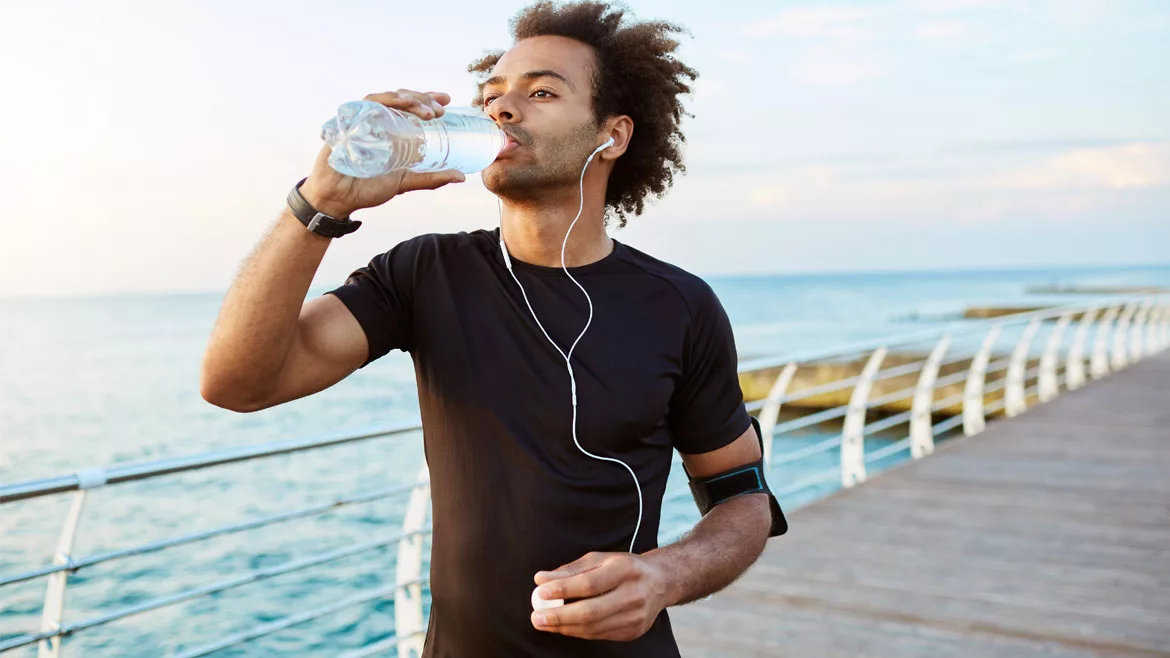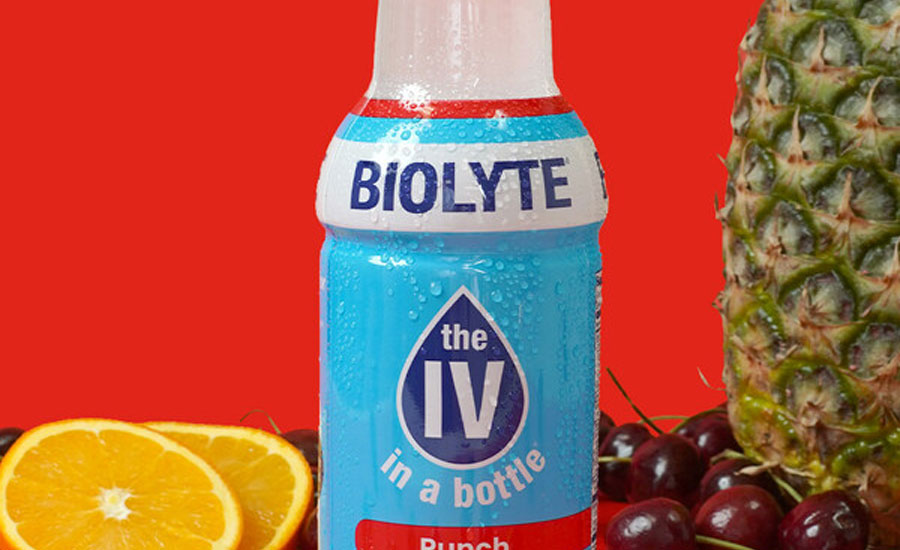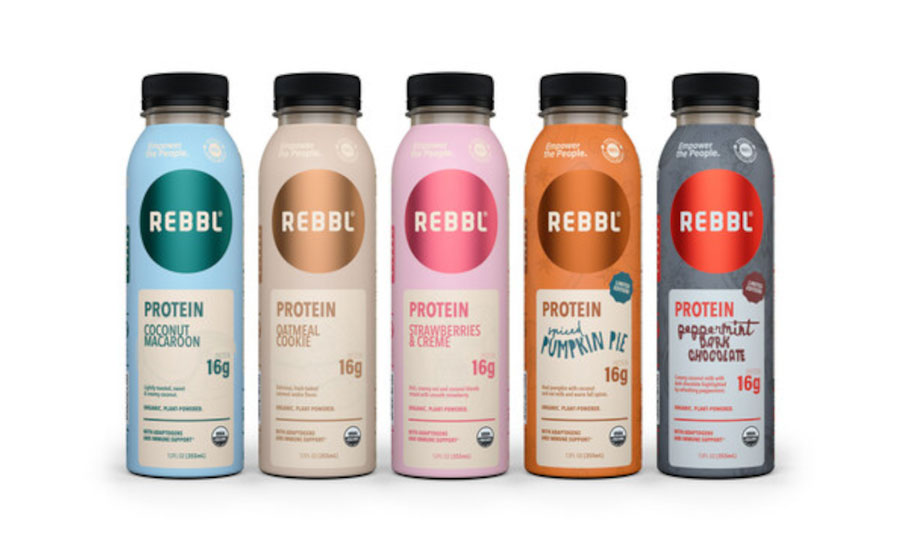R&D Feature
Health, fitness trends spur growth for sport nutrition drinks
Functional ingredients, health attributes bring broader consumer appeal

Image courtesy of Blue California
Serving as the 35th president of the United States, John F. Kennedy remains the youngest elected president to have served when he was inaugurated Jan. 20, 1961, at the age of 43. Despite his energetic presence, Kennedy, who is known to have suffered from various health issues, said: “Physical fitness is not only one of the most important keys to a healthy body, it is the basis of dynamic and creative intellectual activity.”
Today, as physical fitness remains top of mind for those seeking healthier lives, consumers not only are turning to sports drinks that deliver on hydration and recovery, but also seek such drinks to help meet overall wellness goals, experts note.
“Athletes keep their bodies in optimal condition, and this holistic practice has become a trend for consumers who value fitness and remain health vigilant — even the weekend warriors,” says Linda May Zhang, Ph.D., vice president of innovation at Blue California, Rancho Santa Margarita, Calif.
With physical activity — where the body undergoes stress and discomfort to various degrees — nutritional products not only can help athletes keep their bodies functioning, but also support consumers in their health quest or daily lifestyle, Zhang explains.
“In addition to benefits like boosting energy and building muscle, consumers today are also interested in other functional health benefits in their foods and beverages, such as improving immune and digestive health,” Zhang says, citing Innova Market Insights, 2022. “These new interests share traditional segment lines of energy, hydration and protein benefits, including ingredients that offer new health benefits like immune support and healthy aging.”
Marianne McDonagh, vice president of sales at Bioenergy Life Science Inc. (BLS), Ham Lake, Minn., echoes similar sentiments, noting that more consumers are turning to performance beverages to help meet various need states.
“The performance beverage market has grown over the years as more consumers see them as a convenient and often effective way to help them get through the day and whatever they are doing,” she explains. “And, these consumers also want ‘better-for-you’ options in keeping with their healthier lifestyles.
“The trend is toward fueling and supporting the body’s natural energy production and exercise recovery,” McDonagh continues.
Niki Kennedy, director of insights and content at Chicago-based Glanbia Nutritionals, explains that two trends are at play as the sports nutrition market broadens.
“First, the focus for those dedicated to athletic performance has become even more specific in their rigorous routines with sports recovery paying attention to before (pre-workout), during and after (post workout) to optimize performance and prepare and sustain recovery,” she says. “Second, the growth of the active nutrition consumer has diversified beyond those whose dedication is primarily athletic performance and disciplined training to those who incorporate fitness as part of a more balanced lifestyle, creating a market for more convenient and multi-nutrient supplements including recovery ingredients.”

Image courtesy of BIOLYTE
Rejuvenation, energy attributes are key
As today’s consumers have become even more health conscious and curious about new beverage experiences, experts highlight that by incorporating various ingredients into sports nutrition drinks, beverage-makers can deliver on consumer desired health attributes.
“We’re noticing a trend of brands seeking to differentiate themselves with functional beverage ingredients,” Blue California’s Zhang notes. “They are exploring innovative ingredients for fitness and sports performance markets, such as Blue California’s specialty ingredients of ergothioneine, PQQ, vitamin K2, and more.”
In terms of replenishing the body, Zhang points to Blue California’s ergothioneine as an ideal ingredient to formulate in sports recovery, fitness beverages, and everyday beverages to support holistic health and healthy aging.
“Formulating with ergothioneine may provide consumers additional benefits for sports recovery, including combating oxidative stress and preserving cellular health,” Zhang explains. “Oxidative stress is when there is an imbalance of antioxidant systems and oxidative forces within the body, meaning the body is impacted by free radicals. This causes inflammation and cellular injury, interfering with the body’s ability to recover and perform. Immune function is also decreased.
“Ergothioneine is a ‘longevity vitamin’ that can perform antioxidant actions within cells and mitochondria,” she continues. “This ingredient has been demonstrated to reduce the rate of telomere shortening under oxidative stress conditions. Telomere length is considered a cellular marker of health status and biological aging, and evidence suggests that oxidative stress from exercise may impact telomere length.”
BLS’ McDonagh highlights the use of Bioenergy Ribose in performance beverages, providing crucial sugar, as well as cellular energy.
“Some ingredients, such as Bioenergy Ribose, have been the ‘best kept secrets’ among endurance athletes for many years,” she says. “Bioenergy Ribose is a well-established ingredient in a full spectrum of sports nutrition products because it drives the ATP replenishment process, helping to achieve steady, sustainable energy levels with no crash.
“After workouts, supplementing with Bioenergy Ribose improves the speed of muscle recovery by more than 50%, while decreasing cramping and soreness,” McDonagh continues. “This is why it is a commonly used ingredient in recovery-based products. Published studies have also determined that supplementation with ribose may reduce post-workout fatigue.”
Alex Bloom, marketing and communications, Applied Food Sciences (AFS), Austin, Texas, suggests that glucarate is an ingredient that every beverage-maker should have on their radar.
“Don’t underestimate the liver’s role in sports recovery,” he says. “Liver health directly relates to our body’s ability to manage inflammation by removing ROS (reactive oxygen species) from our cells. Glucarate enhances the liver detoxification process, which is not only critical in transferring ROS but also removes other physical stressors induced during exercise.
“Examples include excess hormones like estrogen and cortisol and other toxins redeposited in the bloodstream during vigorous exercise,” Bloom continues. “A dysfunction in detoxification can lead to an accumulation of harmful compounds in the hepatic system, ultimately reducing recovery times. Including glucarate in sports recovery products can help boost the liver’s ability to efficiently remove elevated levels of metabolites produced during and after workouts, speeding up the recovery process.”

Image courtesy of REBBL
Proteins, amino acids remain key
As protein is a critical nutrient in supporting muscle recovery, experts note that by adding proteins and its essential amino acids to sport drinks, beverage-makers can deliver on enhanced health attributes.
Because intense resistance or endurance exercise can speed protein breakdown and lead to prolonged muscle soreness and fatigue, hydrolyzed proteins and peptides provide increased absorption and recovery for those seeking the most premium drink options, Glanbia’s Kennedy explains.
“It can also be beneficial to add amino acids on their own like the BCAAs — leucine, isoleucine and valine — for speedy recovery,” she says. “Leucine is particularly popular for triggering the protein synthesis process.
“Electrolytes and water are essential to proper hydration and exercise recovery,” Kennedy continues. “The most popularly used electrolytes include sodium, chloride, potassium, magnesium and calcium.”
AFS’ Bloom suggests beverage-makers also should consider keto-friendly, vegan, plant-based protein from hemp hearts to aid in rebuilding muscle with its supporting amino acids.
“Protein and its essential amino acids are the leading ingredients in most sports nutrition recovery formulations since protein is key to restoring muscles to the cellular level. With dietary specifications rising in popularity, including keto, vegan and paleo, proteins from plant sources are increasingly used in sports recovery formulations,” Bloom explains. “Hemp seed protein is an emerging ingredient in this space.
“Hemp seeds are a nutritional powerhouse in that they contain a superior fatty acid profile and a high-quality makeup of digestible edestin and albumin protein,” he continues. “Edestin helps carry amino acids and oxygen to the cells to further support workout recovery, repair muscle cells, and regulate the nervous system.”
BLS’ McDonagh notes that, as carb load is important for many of today’s consumers, Bioenergy Ribose is one of the few carbs that can be consumed by someone following a strict keto diet.
Bioenergy Ribose is clean label, Non-GMO Project Verified, FDA certified as GRAS, Halal, Kosher, gluten-free and keto-friendly, McDonagh notes, “[A]ll the things that make life easier for our performance beverage customers,” she says.
Aiding bone, joint health with functional ingredients
As bone health is important at every stage of life, such importance creates a largely untapped opportunity for beverage-makers to target all consumers, experts note.
“Bone health is influenced by bone mass and body mechanics, aided by proper nutrition throughout life,” Glanbia’s Kennedy explains. “During the formative years, it’s important to maximize peak bone mass, while in the later years, reducing bone loss becomes paramount.
“While supplements continue to lead in bone health product launches, bone health claims are on the rise in the beverage category — specifically in plant-based and meal replacement beverages,” she continues. “Among new food, beverage and supplement launches globally with bone health claims, plant-based beverages with claims grew by over 50% and nutritional/meal replacement drinks by 40% in the past five years.”
As a nutritional ingredient leader, Glanbia Nutritionals provides ingredients that support optimal health based on the latest science, such as TruCal, a balanced milk mineral complex, Kennedy says.
“[TruCal] delivers all the minerals bones need and has been shown to help improve bone density and strength,” she explains. “Our All N Off-the-Shelf Bone Health Premix with TruCal and vitamin K2 allows brands to produce foods, beverages and supplements fully optimized for bone health support.”
Pointing to vitamin K2’s popularity in functional drinks, Blue California’s Zhang notes that it’s an ideal ingredient for bone health — reducing the risk of bone fractures and maintaining bone strength in certain subpopulations.
“Blue California makes both MK-4 and also MK7 for increased bioavailability,” Zhang explains.
“Ergothioneine, the ‘longevity vitamin,’ is water-soluble and neutral in color, taste and odor, making it perfect for beverage formulations. Ergothioneine may help combat oxidative stress that contributes to diminished bone and joint health.
“Along with functional benefits to support bone and joint health, such as vitamin K2 and ergothioneine, consumers seek reduced sugar content and innovative, refreshing flavors, such as true-to-fruit and natural,” she continues.
Casey McCormick, senior vice president of innovation at Sweegen, Rancho Santa Margarita, Calif., points to the shared qualities of joint-health formulations and sports recovery products.
“Consumers look to sports recovery products for hydration, energy and nutritional benefits,” he explains. “Joint health formulations share similar qualities of sports recovery products and vitamins such as K2 and D. They help with strength, holistic health, and confidence while performing activities and high-intensity sports. Powders with a vitamin boost are a quick way to regain energy and muscle growth.”
Blue California’s Zhang adds that, although the functional market has grown, a white space exists when it comes to personalized nutrition.
“With more clean nutritional ingredients on the horizon, there are great opportunities for brands to capture interest from new demographics and excite repeat purchases,” she explains. “Ergothioneine and vitamin K2 are ideal examples of similarities supporting the growth of functional beverage markets.
“Ergothioneine combats oxidative stress and supports healthy aging, vitamin K2 promotes bone and heart health — both health functions that capture the attention of the aging, Generation Z, and millennial population,” Zhang concludes.
Looking for a reprint of this article?
From high-res PDFs to custom plaques, order your copy today!






